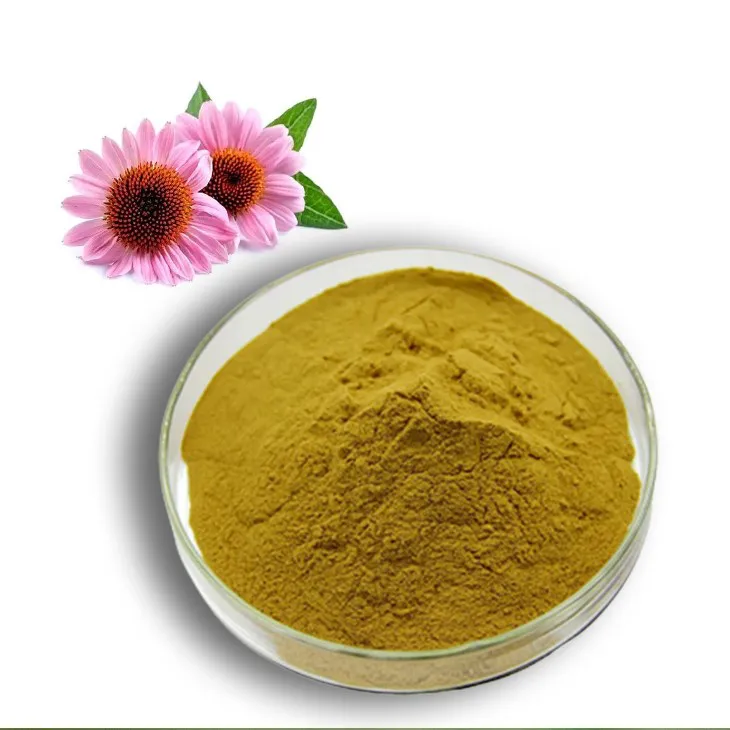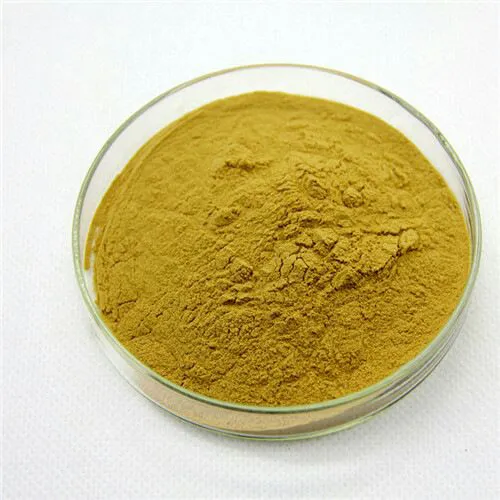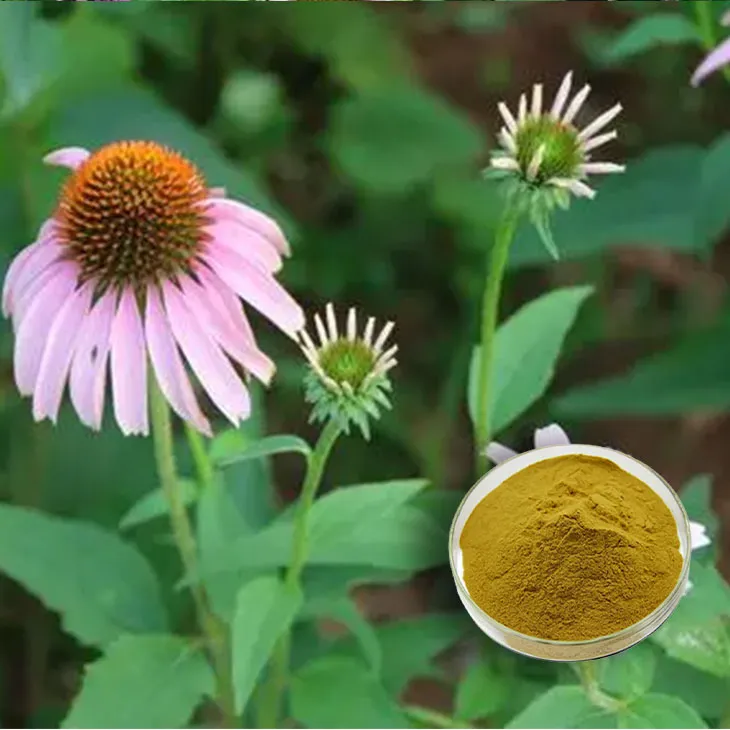- 0086-571-85302990
- sales@greenskybio.com
5 Benefits of Echinacea Extract + Dosage, Side Effects
2024-11-12

1. Introduction to Echinacea Extract
Echinacea Extract is derived from the Echinacea plant, which is native to North America. This plant has a long history of use in traditional medicine among Native American tribes. Over the years, it has gained popularity worldwide for its potential health benefits. The extract contains various active compounds such as alkamides, caffeic acid derivatives, and polysaccharides, which are believed to be responsible for its medicinal properties.

2. The Five Benefits of Echinacea Extract
2.1 Boosting the Immune System
One of the most well - known benefits of Echinacea extract is its ability to support the immune system. The polysaccharides in Echinacea are thought to stimulate the activity of immune cells such as macrophages, T - cells, and natural killer cells. These cells play a crucial role in fighting off infections. Studies have shown that taking Echinacea extract at the first sign of a cold or flu can potentially reduce the severity and duration of the illness. For example, a research study involving a group of individuals who took Echinacea extract when they felt the onset of cold symptoms had a shorter period of illness compared to those who did not take the extract.
2.2 Anti - Inflammatory Properties
Echinacea extract also possesses anti - inflammatory properties. The caffeic acid derivatives in the extract have been shown to inhibit the production of inflammatory mediators such as cytokines and prostaglandins. This can be beneficial in various inflammatory conditions. For instance, in cases of arthritis, where inflammation in the joints causes pain and stiffness, Echinacea extract may help reduce the inflammation and alleviate the associated symptoms. It can also be useful for skin inflammation, such as in eczema or psoriasis, by reducing redness and itching.
2.3 Antioxidant Activity
The compounds present in Echinacea extract, particularly the caffeic acid derivatives, act as antioxidants. Antioxidants are important for protecting the body's cells from damage caused by free radicals. Free radicals are unstable molecules that can cause oxidative stress, which is linked to various diseases such as cancer, heart disease, and neurodegenerative disorders. By scavenging free radicals, Echinacea extract helps maintain the integrity of cells and may contribute to overall health and disease prevention.
2.4 Wound Healing
Echinacea has been used traditionally for wound healing. The extract may promote wound healing through several mechanisms. It can stimulate the growth of new blood vessels (angiogenesis) at the wound site, which is essential for delivering nutrients and oxygen to the healing tissues. Additionally, it has antimicrobial properties that can prevent wound infections. In a study on animal models, Echinacea extract was applied to wounds, and it was observed that the wounds healed faster compared to those without the treatment.
2.5 Respiratory Health
For respiratory health, Echinacea extract can be beneficial. It may help relieve symptoms of respiratory infections such as coughs, sore throats, and congestion. By supporting the immune system and having anti - inflammatory properties, it can reduce the inflammation in the respiratory tract and ease breathing. In some cases, it may also be helpful in preventing respiratory infections, especially during the cold and flu season.

3. Dosage of Echinacea Extract
The appropriate dosage of Echinacea extract can vary depending on several factors, including the form of the extract (e.g., tincture, capsule, tablet), the specific product, and the individual's age, health status, and the reason for use.
- For tinctures, a common dosage is 0.5 - 1 ml three times a day. However, it is important to follow the instructions on the product label as different tinctures may have different concentrations.
- When it comes to capsules or tablets, the typical dosage is 300 - 500 mg, taken two to three times a day. Again, product - specific instructions should be adhered to.
- For preventive use, a lower dosage may be sufficient. For example, taking 300 mg once a day during the cold and flu season might help boost the immune system and reduce the risk of getting sick.
- During an active illness, a higher dosage within the recommended range may be more appropriate to gain the maximum benefits in terms of reducing the severity and duration of the illness.

4. Side Effects of Echinacea Extract
While Echinacea extract is generally considered safe for most people, it can have some side effects in certain individuals.
- Allergic Reactions: Some people may be allergic to Echinacea. Allergic reactions can range from mild symptoms such as skin rashes, itching, and hives to more severe reactions like difficulty breathing and swelling of the face, lips, or tongue. Those with known allergies to plants in the daisy family (Asteraceae), which Echinacea belongs to, are at a higher risk of having an allergic reaction.
- Gastrointestinal Disturbances: In some cases, taking Echinacea extract can cause gastrointestinal side effects. These may include nausea, vomiting, stomach cramps, and diarrhea. These symptoms are more likely to occur if the dosage is too high or if the person has a sensitive stomach.
- Interactions with Medications: Echinacea may interact with certain medications. For example, it can potentially interfere with medications that are metabolized by the liver, such as some anti - epileptic drugs and immunosuppressants. It is important to consult a healthcare provider if you are taking any medications and plan to use Echinacea extract.

5. Conclusion
Echinacea extract offers several potential benefits, including immune system support, anti - inflammatory effects, antioxidant activity, wound healing, and respiratory health benefits. However, it is important to use it in the correct dosage and be aware of the possible side effects. As with any herbal supplement, it is advisable to consult a healthcare professional before starting to use Echinacea extract, especially if you have underlying health conditions or are taking other medications.
FAQ:
What are the five benefits of Echinacea extract?
Echinacea extract is believed to have several benefits. Firstly, it may boost the immune system, helping the body to better fight off infections. Secondly, it has anti - inflammatory properties, which can be useful in reducing inflammation in the body. Thirdly, some studies suggest it might have antioxidant effects, protecting cells from damage caused by free radicals. Fourthly, it could potentially help in alleviating the symptoms of the common cold, such as reducing the duration and severity of cold symptoms. Fifthly, it may support skin health, potentially being beneficial for certain skin conditions.
How should the correct dosage of Echinacea extract be determined?
The correct dosage of Echinacea extract can vary depending on various factors. It is often recommended to follow the instructions on the product label. In general, for dried Echinacea root or herb, a typical dose might be around 300 - 1000 mg three times a day. However, for Echinacea extract in tincture form, the dosage could be different, usually around 0.75 - 1.5 ml three times a day. It is always best to consult a healthcare provider, especially if you have any underlying health conditions or are taking other medications, as they can provide personalized dosage recommendations.
What are the possible side effects of Echinacea extract?
Some possible side effects of Echinacea extract include gastrointestinal issues such as nausea, stomach pain, and diarrhea. In some cases, people may also experience allergic reactions, especially those who are allergic to plants in the daisy family. Additionally, it may interact with certain medications, so it's important to inform your doctor if you are taking Echinacea extract while on other drugs.
Can Echinacea extract be used long - term?
There is some debate about long - term use of Echinacea extract. While short - term use for acute conditions like the common cold is more common, long - term use may carry some risks. Prolonged use may potentially lead to more significant side effects or may even interfere with the body's normal immune function over time. It is advisable to use it under the guidance of a healthcare professional if long - term use is considered.
Is Echinacea extract safe for everyone?
Echinacea extract is not safe for everyone. People with autoimmune diseases should be cautious as it may stimulate the immune system and potentially exacerbate their condition. Pregnant and breastfeeding women should also avoid using it as there is not enough evidence to confirm its safety during these periods. Additionally, those with known allergies to plants in the daisy family should not use Echinacea extract.
Related literature
- The Immunomodulatory Effects of Echinacea"
- "Echinacea: Benefits, Dosage, and Safety Considerations"
- "A Review of Echinacea in the Treatment of Inflammatory Conditions"
- ▶ Hesperidin
- ▶ citrus bioflavonoids
- ▶ plant extract
- ▶ lycopene
- ▶ Diosmin
- ▶ Grape seed extract
- ▶ Sea buckthorn Juice Powder
- ▶ Beetroot powder
- ▶ Hops Extract
- ▶ Artichoke Extract
- ▶ Reishi mushroom extract
- ▶ Astaxanthin
- ▶ Green Tea Extract
- ▶ Curcumin Extract
- ▶ Horse Chestnut Extract
- ▶ Other Problems
- ▶ Boswellia Serrata Extract
- ▶ Resveratrol Extract
- ▶ Marigold Extract
- ▶ Grape Leaf Extract
- ▶ blog3
-
High purity olive leaf extract
2024-11-12
-
Lavender oil extraction method
2024-11-12
-
100% organic virgin sea buckthorn fruit oil
2024-11-12
-
Lotus leaf extract powder factory in China
2024-11-12
-
China aged garlic extract supplier
2024-11-12
-
Deer antler extract powder manufacturer
2024-11-12
-
Saw palmetto extract vs whole herb
2024-11-12
-
Mulberry leaf Extract
2024-11-12
-
Dan Shen Root Extract/Salvia Root Extract
2024-11-12
-
Saffron Extract Powder
2024-11-12
-
Sophora Flavescens Root Extract
2024-11-12
-
Stevia Extract
2024-11-12
-
Natural grape seed extract
2024-11-12
-
Hawthorn Extract
2024-11-12
-
Echinacea Extract
2024-11-12
-
Plantain extract
2024-11-12
-
Scutellaria Extract
2024-11-12




















